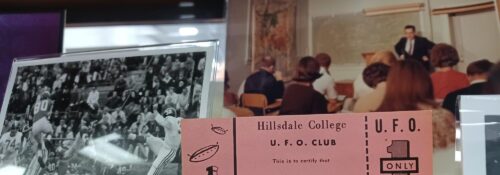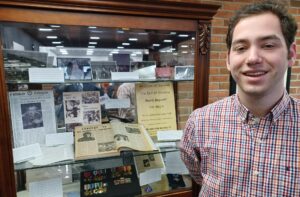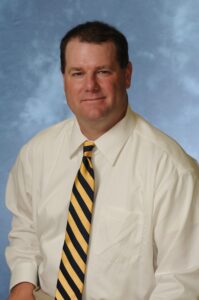
Peace, Love, and Hillsdale College?
Written by Doug Goodnough
 Alex Buchheit, ’22
Alex Buchheit, ’22
The late 1960s and early 1970s were a time of turmoil and cultural upheaval in America. There was Woodstock and the Summer of Love. And then the Vietnam War and the violent anti-war protests that came with it were happening at many college campuses around the country. The most notable of this violence were the Kent State University shootings.
But what about the Hillsdale College campus climate at the time? That was a question Alex Buchheit, ’22, tried to answer with his senior museum studies project: “Hillsdale College During the Vietnam Era.”
“Right before the fall of 1969, (Hillsdale College) President (J. Donald) Phillips sent a letter out (to students saying) that studying at Hillsdale College is a privilege and not a right,” said Buchheit, who spent much of the spring semester conducting research into the history of the College during that time. “And those who infringe upon it by protesting violently, taking over college property … would be expelled.”
Buchheit said there was a protest on May 8, 1970, at Central Hall called the “Be-In.” However, the self-proclaimed “Moral Boycott” was peaceful, and according to Buchheit, the College stayed that way during and after the war.
“Given that (the war) was so controversial, were there big college protests? Was the College different back then as to now? It turns out, not really,” he said.
The history and German double major spent most of the second semester of his senior year scouring the College archives and interviewing former students who lived through that time—including a couple of decorated war heroes. He presented his findings in April 2022 that included a curio cabinet case full of artifacts and information from that era. The exhibit was prominently displayed in the Mossey Library through Commencement weekend.
“Hillsdale is known as the college that sent the most men to fight during the Civil War,” Buchheit said. “There are all of these other wars that the United States has fought, and Hillsdale has been a part of, and one of the wars in recent memory that I could actually talk to alumni about is the Vietnam War.”
He interviewed decorated Vietnam War veterans Duane “Dutch” Van Fleet, ’73, and Peter Stark, ’72, for his project. Van Fleet, now living in Alabama, was one of 88 Marines who were fending off more than 1,200 North Vietnamese soldiers during a three-day battle. Despite having a chest wound, Van Fleet crawled through enemy fire and rubble to call in artillery and air support that eventually saved him and about 20 of his buddies. He was awarded the Bronze Star for Valor.
Stark, a former Green Beret now living in South Carolina, was part of a team who was trying to deliver a captured North Vietnamese army intelligence officer for interrogation when an enemy shell blew off both of his legs. Despite the crippling injury, he held the landing zone and delivered the prisoner and his team to safety. He eventually received the Distinguished Service Cross for his valor.
“I felt honored that I had the chance to talk to these guys,” said Buchheit, who also displayed some of their war medals along with their stories. “It was humbling.”
In fact, the College attracted a number of Vietnam War veterans who were looking to attend college without having to deal with the hostility that was prevalent at larger, public universities.
“They both loved it here,” Buchheit said of Van Fleet and Stark. “(They said) everyone treated them with dignity and respect and friendship.”
He added that Van Fleet said Hillsdale was the reason why he transitioned so easily after the war. Buchheit said Van Fleet told him that Hillsdale “set him on a path that allowed him to heal as a man.”
Another source Buchheit interviewed, Linda Berk Voit, ’73, said she was the “sweetheart” of the Veterans Club.
“Apparently a lot of vets had interesting and exotic animals on campus,” Buchheit said. “One of them had a bright yellow python that hung out in the old (Knorr) snack bar. She said it scared her so much she wouldn’t grab her coffee and toast in the morning.”
There were notable campus events such as the appearance of music legends Neil Diamond and John Denver at the field house in 1970. Or the UFO Club, which promised “free rides” around Central Hall. Buchheit said his findings have Hillsdale staying true to its original intent of “pursuing the good, the true, and the beautiful.”
“Hillsdale created a counter-counter-culture movement in returning to decency and normalcy,” Buchheit said of the period. “And I liked finding out that Hillsdale didn’t conform or bend to outside pressure.”
Buchheit is interning this summer at the Ronald Reagan Boyhood Home in Dixon, Illinois. This fall, he will attend Wright State University, where he will begin a two-year master’s program in public history in the hope of one day becoming a curator.
“I didn’t expect to have this much information available to me,” Buchheit said of his senior exhibit. “I thought it would have been probably a yearbook photo here, a Collegian article there. Hillsdale has done a really good job of preserving its history. Talking to alumni about what life was like back then was a lot of fun.”

Doug Goodnough, ’90, is Hillsdale’s new director of Alumni Marketing. He’s looking forward to connecting with fellow alumni in new and wonderful ways.
Published in June 2022